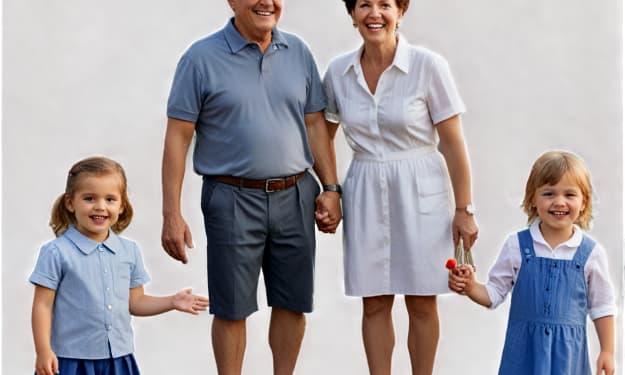Five Questions to Ask Yourself Before Becoming A Foster Parent
These are the ones no social worker will ask.

I’ve been a foster parent for five years, which is both longer than many foster parents last in the system, and a drop in a very big bucket. My partner and I have seen over a dozen kids through our home, some only for one night, and some for months at a time. With every kid, I’ve learned more than I ever thought my brain or my heart could hold.
Becoming a foster parent, if you’re doing it right, involves a series of radical shifts. Nothing else I’ve ever done has so thoroughly tested and challenged my notions of who I am, what I believe, and how I do.
And yet: when people ask me if I think they could do the work — if they could thrive in this system, and give kids what they need to thrive — I’m more likely than not to say yes. Some kid likely needs what you have. Ask the questions. Do the training. See what happens.
If you’re considering diving into the wreck with us, here are some good starting questions to get you on your way.
1. Why foster care?
Okay, so your social worker WILL ask this one. But it is an absolutely crucial one. If your answer is, “to help children,” then the followup is going to be, “Then why not be an after school tutor? A pen pal? A Big Brother or Big Sister? A legal advocate?”
For some, the answer is going to be about a specific child — a student who suddenly needs a guardian, your niece whose parents are in the hospital, your child’s friend who eats dinner with you twice a week already. But for those of us who begin this without a specific child in mind, we need a one-sentence answer, and a much longer one. Mine is: “I’m needed, and I can.”
2. Do I want this child to call me Mom/Dad?
I’ll tell you why this one’s a biggie — it’s revealing. If you answer, “Well, yes,” or “After we get to know each other, sure,” then, good job being honest! You’ve just waved your own red flag.
There’s nothing wrong with wanting to be called Mom or Dad. Really! It’s a totally understandable thing to want! We ascribe all sorts of meaning to those titles — they can show trust, belonging, love, respect, all sorts of good things that are okay to want.
However. As a thousand generations of parents before us have said: I want doesn’t get.
You don’t get to choose how your children view you, or how they cast you in the great big story of their lives. For some, you’re going to be the bad guy. For some, you’re a bit part, a background character that won’t even show up in the credits. And even if you get cast as Best Supporting Character In The Life Of This One Child, you might well be listed as “Lauren,” or “Mike,” or “Foster parent #4.” And if you’re going to do the job well, you have to be okay with this.
To demand that a child cast you in the role you want to play isn’t going to get you what you want. It’s not going to get you love. It might get you a facsimile of respect that sounds good when you tell other people about it. But the only person who gets to decide the part you play is your kid. And each one is going to be different.
If this one stings, good. Let that sink in. Consider taking a rest stop before continuing on your journey. It’s okay. We’ll be here when you’re ready — if you’re ready. Promise.
3. How do I feel about new friends?
I don’t know about you, but I like my friends. A lot of my friends are like me — they’re white, they’re highly educated, they’re nerdy readers with a specific sense of humor. I’ve cultivated a tight group of people who are my chosen family.
And with certain kids, I’m going to have less time for them. I’m going to need to make — and KEEP — new friends.
We’re talking about race here, but we’re also talking about class, religion, and culture. Kids need to be not just “exposed to” (an absolute UGH of a phrase if ever there was one) people who share their race, culture and class backgrounds — they need to be held by them. Loved by them. Watched over, taught, and nurtured by them.
This is going to be awkward and hard, especially for those of us who haven’t been forced to “get along” in spaces where we’re the only one of our kind (the only woman, the only LGBTQ person, the only person of Color, the only immigrant.) It is uncomfortable as all get-out. And it’s the only way to do right by your kids.
The good news? Often, the place to start is your kid’s own family! Many people expect to have little or no contact with a kid’s family of origin, and it’s just not true. A lot of us have, with a little Facebook digging, helped make connections between kids and extended family members who may not have been aware of the situation, and are more than happy to come visit, chat on the phone, and build a relationship with their nephew/cousin/great-grandniece. It can be, in many situations, an excellent starting place.
If you feel like you’re not ready to expand your circle of people who can trust and count on you (and on whom you can count and trust) to include people who might be very, very different from you, that’s a good sign to pause and do some reading and thinking before going forward.
4. Will I expect children in my home to do as I do?
So your family’s vegan. Or maybe you go to synagogue every Saturday. Or you have a tradition of holding hands around the dinner table and giving thanks. How much are you willing to bend to accommodate the kids who come through your home?
Ask yourself where your lines are. Where do you compromise? Where do you yield entirely? If you’re vegetarian, what would mean or take for you to keep some hot dogs in the freezer? To skip church for a few weeks, or allow a kid to spend church in the lobby with a tablet or a smartphone?
If stuff like this is rankling you and getting your hackles up, that’s okay — it’s just information you need to have.
Kids — even young ones — will come into your house as fully formed people, with their own likes, dislikes, preferences and comforts. Your job is to make your home as safe and welcoming as possible — even if that means changing the nesting material from organic cotton to a more familiar polyester, or opening your fridge to accommodate worms along with the birdseed.
(Yeah, okay, that metaphor went a little sideways, but you know what I mean!)
5. How do I feel about apologies?
I can have a mean streak. I’m fast with words, and quick tempered. I can think of comebacks and zingers for just about everything that comes my way. And yeah, I’ve said more than my share of regrettable things. Even to children.
Here’s the thing, though — growing up with a tongue two steps ahead of my brain gave me a lot of practice in apologizing well. And that skill has served me better than just about any other — particularly since we’ve had a lot of teens come through.
So much of foster parenting can feel monumental, like every single interaction is of huge consequence. It’s natural to want to do well by kids. Even more so to want to be perfect.
(After all, if you parent perfectly, doesn’t that mean you’ll have no problems? Let’s laugh HARD together at that one, friend. I’ll get you a tissue.)
One of the biggest things I’ve learned is that a dozen perfectly parented moments don’t have half the impact of repairing a poorly parented moment. My kids don’t generally remember the perfect (ha!) advice I’ve crafted about their school problems, but they remember me coming to their door and slipping the notes underneath that read:
I’m so sorry. I shouldn’t have said that thing. You have every right to be angry. I’ll be in the kitchen when you feel ready to hear my apology in person. Also, I’m making tea if you want some.
Kiddo, I am still so angry right now, so I’m going to walk around the block until I feel like a person again. After that, I should be able to talk about this without yelling.
Sweetheart, these misunderstandings are so painful, aren’t they? I can hear how disappointed and angry you are. I’ll be folding laundry and watching Jeopardy for the next half hour. I’m not up for more arguing, but if you want to come watch with me, there’s a spot on the couch with no socks on it just for you.
Good repairs are made of stronger stuff than seamless stitching. And when I talk to people who are considering becoming foster parents, it’s the number one thing I ask: how do you feel about apologizing to your kid when even when you’re not the only one in the wrong?
If you’ve made it through all these questions with your defenses still down, that’s great. If you found yourself arguing with me over a few answers, that’s also great!
None of this is judgment; it’s just information that’s helped me as I’ve meandered through this wild parenting shenanigan. I hope it helps you, too.
About the Creator
Dane BH
By day, I'm a cog in the nonprofit machine, and poet. By night, I'm a creature of the internet. My soul is a grumpy cat who'd rather be sleeping.
Top Story count: 17
Check out my Vocal Spotlight and my Vocal Podcast!







Comments
There are no comments for this story
Be the first to respond and start the conversation.